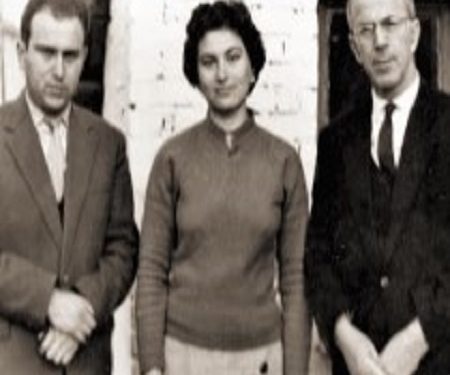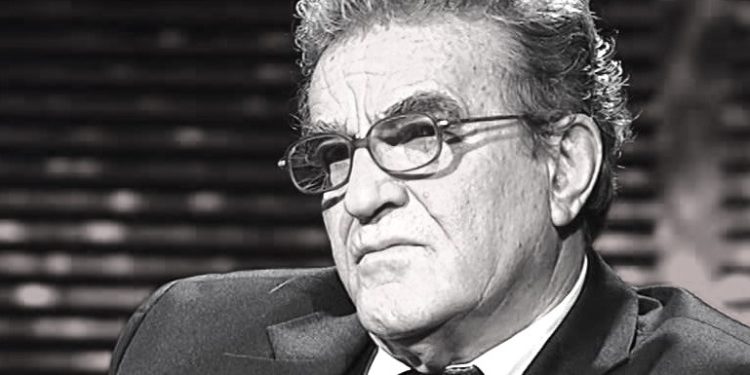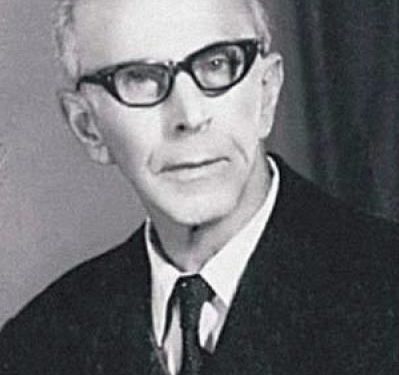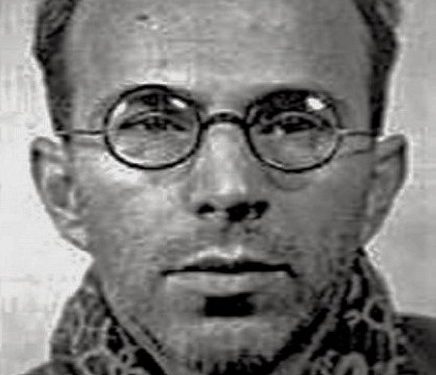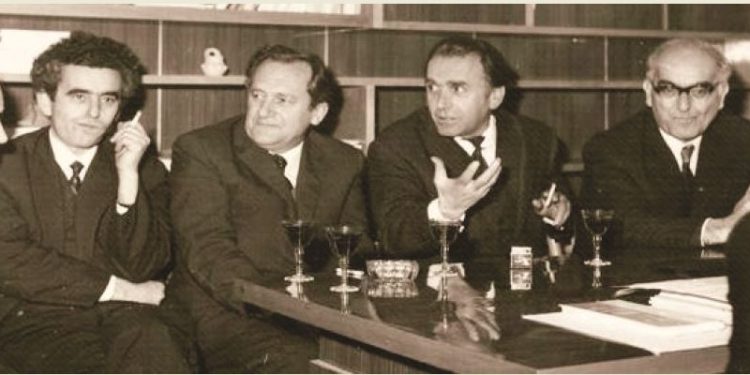Memorie.al / Whenever I had the chance to meet Professor Selman Riza, or to read his most important works in the field of the Albanian language, the question always bothered me internally: When did he have that necessary time and composure to create his work, while he was deprived of freedom for almost his entire life: interned, imprisoned, and politically persecuted?! Because the life “pauses,” when he breathed freely, were so few, so short, and so tense, that it seems paradoxical and unbelievable that a scientific work of distinguished Albanological value could have been realized during that time.
The Explanation:
This work is the product of both a genius and, simultaneously, an extraordinarily intensive work during the relatively calm moments of his life; it is the result of a predetermined mission that he himself felt and understood, and in any case, was determined to achieve.
I believe this is the reason why the young or old Selman Riza tried to gain time, fighting not to lose a single moment of his terribly cruel life. Thus, as early as the age of 13, he crossed the Albanian-Yugoslav border and, within six years, brilliantly finished 9 classes of the Korça Lyceum.
Within three years, he completed two faculties simultaneously in France, Literature and Law. He rapidly mastered the main languages of the West and the East. He critically studied and grasped all the domestic and foreign experience in the field of the Albanian language.
He hurried to gain time and materialize it.
He hurried…! But his enemies, who were also the enemies of Albania, blocked his path, cut short the thread of his work, and endangered his life. For this, Selman Riza’s own activity became the cause.
Because his work as a scientist was never separated from that of a freedom fighter and a missionary for our national cause. He greeted the fascist occupation of Albania with indignation and, together with other professors of the Korça Lyceum, organized protests and demonstrations with the students. For this, he was transferred (interned) from Korça to Ventotene, Italy. Duce and the fascists were the first major enemies Selman Riza clashed with.
In 1942-1943, he openly acted in Kosovo as a representative of the Albanian intelligentsia, fighting against fascism and against the return of Serbian occupation to Kosovo. In December 1943, he published a tract with a programmatic content, which can be called a Manifesto of Irredentism and of the struggle for the union of Albanians of Kosovo and other regions under Yugoslavia, with the Albanian people and state.
This is the reason why Selman Riza welcomed the “Decalogue” of the National Front (Balli Kombëtar), as a program where the issue of Kosovo and national unity held the primary place. Fully committed to the Kosovo issue, he prepared for publication a 2000-page work, titled; “Documentary of the Albanian Antithesis,” to overturn the Great-Serbian thesis regarding the national issue in Kosovo. Meanwhile, his first well-known work, “Three Albanological Monographs,” saw the light of publication in Tirana.
But the Kosovo issue was basely betrayed by the leaders of the Albanian Communist Party and Kosmet (Kosovo and Metohija), who were tools of the Yugoslav Communist Party. “The place of the ‘Balli’ here with us,” the Regional Committee of Kosmet informed the Central Committee of the Albanian Communist Party, “is being taken by irredentism, which is nothing more than a branch of the ‘Balli.’ Irredentism is led here by Selman Riza, the friend and comrade of Safet Butka.
They have also published a brochure, where they present their character and qualities, as well as the path they will follow.
In the brochure, they do not directly attack us, but they hint that they will also attack us in writing, as they have not ceased attacking us orally, virtually since Selman Riza arrived in Kosovo. Communist fraternal greetings – For the Regional Committee of the Yugoslav Communist Party, for Kosovo and Dukagjin – Blini 9.2.1944.”
The cooperation between the Regional Committee of the Communist Party of Kosovo and the leaders of the Albanian Communist Party is more than clear and documented, aiming to strike Albanian nationalism and its prominent figures on both sides of the border, especially Selman Riza, who was fighting on the most difficult front. I will add another meaningful element.
When Safet Butka sacrificed himself to stop fratricide after the breakdown of the Mukje Agreement, his wife found only one thing in the inner pocket of his bloody jacket: a photograph of Selman Riza!
In a state archive document (dated 10.05.1944, Fund 35, File 138), which contains a message from Mid’hat Frashëri addressed to Dhimitër Fallo regarding a draft agreement with the Greek right-wing, to counter the communist danger threatening both countries, Selman Riza figured as the representative of Kosovo.
What connected the nationalist Selman Riza to this commitment, as the representative of Kosovo, was the request of the Albanian right-wing for the Greek side to support the legitimate Albanian claims for Kosovo and the Dibra area. To escape the fierce persecution in Kosovo, he returned to Tirana. He stayed in our house at that time. It wasn’t long before they came to arrest him by order of Koci Xoxe, and by his order, they sent him to Yugoslavia.
Thus, “human merchandise” was exchanged between collaborators, and the nation’s culture was murdered. This way, it was easier for the communist ignoramuses and boors, such as Enver Hoxha, Koci Xoxe, Kristo Themelko (“Shulja”), and their patrons in Belgrade, to perpetuate their power, the occupation of Kosovo, and other Albanian territories.
On this path, Selman Riza was their number one enemy. Thus, they sent him to Yugoslavia and brought him back to the prison in Tirana, where he was tortured for 3 years in a row. In January 1948, Enver Hoxha handed Selman Riza over to Yugoslavia again. He was imprisoned in Prishtina until 1951. He would have died there, had he not fallen ill with scurvy, and, almost without hope, skin and bone, they released him from prison to intern him in Sarajevo. But Selman Riza survived.
In December 1955, the Yugoslav side asked him to take Yugoslav citizenship, but he refused. He insisted on returning to Albania, where he had his family, whom the communist regime had persecuted from Tirana and had interned in Sukth. Selman Riza returned from Kosovo to Tirana, while his family reunited with him in a ground-floor room in Tirana, after so many years of separation and suffering.
The professor was not allowed to live with his wife and two young children, neither during the fascist and Nazi occupation nor during the communist one. As a scientific worker at the Institute of History and Linguistics, Selman Riza wrote his most important works, which were compiled by Kosovar researchers in the publication “Albanian Studies I” in Prishtina, 1979.
On the occasion of the author’s 70th birthday. Under conditions of emergency, reprisals, and mass killings carried out by the Yugoslav government in Kosovo, Kosovar researchers managed to publish the first two volumes of Selman Riza’s complete work. Meanwhile, “The Verb System of Albanian” remained in manuscript.
Selmani was a scrupulous scientist, but also a demanding conversationalist. Whenever I talked to him, I was careful to choose my words, not only for them to be of Albanian origin but also to be functional for correct, semantic, and grammatical usage. Because the professor would follow and correct you. He did this with Sabireja, his wonderful wife, and he did it with guests and relatives.
I remember when I sent him a New Year’s card from the village of Verri i Fierit, where I was a teacher, wishing him, among other things, success in his noble work. He replied to my wish with warmth, but did not forget to chastise me thus: “Work that is paid cannot be called noble.”
Selman Riza’s distinguished works, such as “The Albanian Articles” (Nyjet e shqipes), “The Albanian Possessives” (Pronorët e shqipes), etc., aroused the envy and anger of the incapable careerists at the institute, who found their fullest representation in the director, Androkli Kostallari.
These works and direct, rigorously scientific criticism, the rebellious fight against dictation from above, the irreconcilability with injustice, opportunism, dilettantism, the politicization and ideologization of language and linguistic criticism, etc., cast a shadow, irritated, and violated the “barren Gods of the Albanian communist Olympus,” even the super-Zeus himself, who in the spiritual desert where he lived, had a craving, a feverish and criminal craving for glory.
They planned the savage crucifixion of Selman Riza, which was carried out by their zealous and arriviste tools, such as Fadil Paçrami and Androkli Kostallari. S. Riza’s file was reopened. The war against him was re-declared. The small, but unscrupulous tyrant, A. Kostallari, led the crusade against the unprotected personality of Selman Riza, with the shameful, fascist-style slogan; “Let’s cut off S. Riza’s head!”
Then, the long, manipulated meetings – in fact, Inquisition-style trials – and, finally, the violent expulsion from the center to the province, in the Chinese style of the Cultural Revolution, Selman Riza was interned in Berat, removed from scientific work, isolated, and persecuted. The scientist ended up as a guide in the Berat Museum, surveilled and followed closely by the State Security. Nothing by Selman Riza was allowed to be published anymore.
In his last years, Professor Selman Riza was surrounded by silence and afflicted by severe illness. The red pashas, intoxicated by the delirium of grandeur and modern comfort, those who, for a cosmetic whim, went abroad whenever they wanted, did not remember Selman Riza, who was suffering and could not find a cure.
None of them remembered to publish S. Riza’s work, such a valuable legacy in the field of our national culture. (The Kosovar brothers did this, under the difficult conditions of Serbian rule). None of them remembered him; neither when he was alive nor when he died.
Even the director of the Institute of Linguistics and Literature, A. Kostallari, did not deign to attend the burial ceremony. No one from the institute said even a single word over the grave of the great master of Albanian linguistics. But the hearts of thousands of Albanians who respectfully accompanied the professor to his final resting place spoke and wept. Immortality itself spoke. Memorie.al




